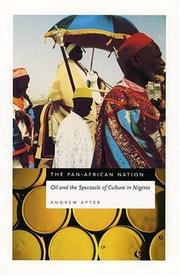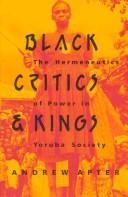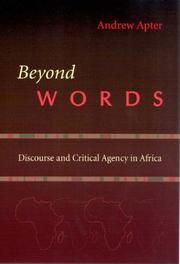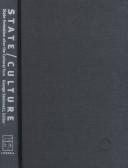| Listing 1 - 7 of 7 |
Sort by
|

ISBN: 0226023540 0226023559 9780226023557 9786612426087 1282426087 0226023567 9780226023564 9780226023540 9781282426085 661242608X Year: 2005 Publisher: Chicago, Ill. University of Chicago Press
Abstract | Keywords | Export | Availability | Bookmark
 Loading...
Loading...Choose an application
- Reference Manager
- EndNote
- RefWorks (Direct export to RefWorks)
When Nigeria hosted the Second World Black and African Festival of Arts and Culture (FESTAC) in 1977, it celebrated a global vision of black nationhood and citizenship animated by the exuberance of its recent oil boom. Andrew Apter's The Pan-African Nation tells the full story of this cultural extravaganza, from Nigeria's spectacular rebirth as a rapidly developing petro-state to its dramatic demise when the boom went bust. According to Apter, FESTAC expanded the horizons of blackness in Nigeria to mirror the global circuits of its economy. By showcasing masks, dances, images, and souvenirs from its many diverse ethnic groups, Nigeria forged a new national culture. In the grandeur of this oil-fed confidence, the nation subsumed all black and African cultures within its empire of cultural signs and erased its colonial legacies from collective memory. As the oil economy collapsed, however, cultural signs became unstable, contributing to rampant violence and dissimulation. The Pan-African Nation unpacks FESTAC as a historically situated mirror of production in Nigeria. More broadly, it points towards a critique of the political economy of the sign in postcolonial Africa.
Industrial economics --- Nigeria --- Petroleum industry and trade --- Revenue --- Pétrole --- Revenus de l'Etat --- Industrie et commerce --- World Black and African Festival of Arts and Culture --- Africa --- Afrique --- Cultural policy. --- Civilization. --- Politique culturelle --- Civilisation --- #SBIB:39A5 --- #SBIB:39A73 --- Government revenue --- Public revenue --- Finance, Public --- Taxation --- Kunst, habitat, materiële cultuur en ontspanning --- Etnografie: Afrika --- Africa -- Civilization. --- Nigeria - Cultural policy. --- Nigeria -- Cultural policy. --- Petroleum industry and trade - Nigeria. --- Petroleum industry and trade -- Nigeria. --- Revenue - Nigeria. --- Revenue -- Nigeria. --- World Black and African Festival of Arts and Culture (2nd : 1977 : Lagos, Nigeria). --- Business & Economics --- Industries --- Pétrole --- Nigeria (Federation) --- Federation of Nigeria --- Nigerija --- Federal Republic of Nigeria --- Colony and Protectorate of Nigeria --- Republic of Nigeria --- Federal Military Government (Nigeria) --- Nai-chi-li-ya --- Nigerii︠a︡ --- Bundesrepublik Nigeria --- Jamhuriyar Taraiyar Nijeriya --- Ọ̀hàńjíkọ̀ Ọ̀hànézè Naìjíríyà --- Orílẹ̀-èdè Olómìniira Àpapọ̀ Nàìjíríà --- ナイジェリア --- Naijeria --- ניגריה --- Nigeryah --- FESTAC --- nigeria, nigerian, africa, african, oil, natural resources, spectacle, nation, state, history, historical, anthropology, global vision, transnational, international, black nationhood, citizenship, cultural studies, culture, economy, economics, violence, postcolonial, postcolonialism, impacts of colonialism, civilization, petroleum, revenue, profit, industry, trade, festival, world, arts, lagos, politics, dissimulation. --- Social policy.

ISBN: 0226023427 0226023435 Year: 1992 Publisher: Chicago University of Chicago press
Abstract | Keywords | Export | Availability | Bookmark
 Loading...
Loading...Choose an application
- Reference Manager
- EndNote
- RefWorks (Direct export to RefWorks)
Yoruba (African people) --- Yorouba (Peuple d'Afrique) --- Politics and government. --- Rites and ceremonies. --- Politique et gouvernement --- Rites et cérémonies --- #SBIB:39A11 --- #SBIB:39A73 --- Antropologie : socio-politieke structuren en relaties --- Etnografie: Afrika --- Rites et cérémonies --- Politics and government --- Rites and ceremonies

ISBN: 9780226023526 9780226023519 0226023524 0226023516 Year: 2007 Publisher: Chicago University of Chicago press
Abstract | Keywords | Export | Availability | Bookmark
 Loading...
Loading...Choose an application
- Reference Manager
- EndNote
- RefWorks (Direct export to RefWorks)
Ethnology --- Discourse analysis --- Culture --- Social problems --- Anthropologie sociale et culturelle --- Analyse du discours --- Problèmes sociaux --- History. --- Philosophy. --- Semiotic models. --- Histoire --- Modèles sémiotiques --- Africa --- Afrique dans la culture populaire --- Afrique --- In popular culture. --- Colonization. --- Social conditions. --- Civilization. --- Colonisation --- Conditions sociales --- Civilisation --- #SBIB:39A8 --- #SBIB:309H511 --- #SBIB:39A73 --- Antropologie: linguïstiek, audiovisuele cultuur, antropologie van media en representatie --- Verbale communicatie: algemene pragmatiek, stilistiek en teksttheorie, discoursanalyse --- Etnografie: Afrika --- Problèmes sociaux --- Modèles sémiotiques --- Reform, Social --- Social reform --- Social welfare --- Social history --- Applied sociology --- Cultural anthropology --- Ethnography --- Races of man --- Social anthropology --- Anthropology --- Human beings --- Discourse grammar --- Text grammar --- Semantics --- Semiotics --- Semiotic models --- History --- Philosophy --- Methodology
Book
ISBN: 022650655X Year: 2017 Publisher: Chicago : University of Chicago Press,
Abstract | Keywords | Export | Availability | Bookmark
 Loading...
Loading...Choose an application
- Reference Manager
- EndNote
- RefWorks (Direct export to RefWorks)
Yoruba culture has been a part of the Americas for centuries, brought from Africa during the transatlantic slave trade and maintained in various forms ever since. In Oduduwa's Chain, Andrew Apter explores a wide range of fascinating historical and ethnographic examples and offers a provocative rethinking of African heritage in Black Atlantic Studies. Focusing on Yoruba history and culture in Nigeria, Apter applies a generative model of cultural revision that allows him to identify formative Yoruba influences without resorting to the idea that culture and tradition are fixed. For example, Apter shows how the association of African gods with Catholic saints can be seen as a strategy of empowerment, explores historical locations of Yoruba gender ideologies and their variations in the Atlantic world, and much more. He concludes with a rousing call for a return to Africa in studies of the Black Atlantic, resurrecting a critical notion of culture that allows us to transcend Western inventions of African while taking them into account.
Yoruba (African people) --- African diaspora. --- Cults --- Orisha religion --- Religion. --- Atlantic Ocean Region --- Nigeria, Southwest --- Religion. --- Religion. --- Black Atlantic. --- Brazilian Candomblé. --- Cuban Santería. --- Haitian Vodou. --- Yoruba-Atlantic. --- creolization. --- orisha worship.
Book
Abstract | Keywords | Export | Availability | Bookmark
 Loading...
Loading...Choose an application
- Reference Manager
- EndNote
- RefWorks (Direct export to RefWorks)
Book
ISBN: 1282650629 9786612650628 1443817902 9781443817905 9781443816380 1443816388 Year: 2010 Publisher: Newcastle upon Tyne : Cambridge Scholars,
Abstract | Keywords | Export | Availability | Bookmark
 Loading...
Loading...Choose an application
- Reference Manager
- EndNote
- RefWorks (Direct export to RefWorks)
Activating the Past explores critical historical events and transformations associated Other embodied memories in the Black Atlantic world. The assembled case-studies disclose hidden historical references to local and regional encounters Other Atlantic modernity, focusing on religious festivals that represent political and economic relationships in "fetishized" forms of power and value. Although memories of the slave trade are rarely acknowledged in West Africa and the Americas, they have ret...
African diaspora. --- Blacks --- Slavery --- Negroes --- Ethnology --- Black diaspora --- Diaspora, African --- Human geography --- Africans --- History. --- Historiography. --- Migrations --- Black persons --- Black people --- Transatlantic slave trade


ISBN: 1501717782 9781501717789 0801436737 9780801436734 0801485339 9780801485336 Year: 2018 Publisher: Ithaca, NY
Abstract | Keywords | Export | Availability | Bookmark
 Loading...
Loading...Choose an application
- Reference Manager
- EndNote
- RefWorks (Direct export to RefWorks)
What impact does culture have on state-formation and public policy? How do states affect national and local cultures? How is the ongoing cultural turn in theory reshaping our understanding of the Western and modernizing states, long viewed as the radiant core of a universal, context-free rationality? This eagerly awaited volume brings together pioneering scholars who reexamine the sociology of the state and historical processes of state-formation in light of developments in cultural analysis.The volume first examines some of the unsatisfying ways in which cultural processes have been discussed in social science literature on the state. It demonstrates new and sophisticated approaches to understanding both the role culture plays in the formation of states and the state's influence on broad cultural developments. The book includes theoretical essays and empirical studies; the latter essays are concerned with early modern European nations, non-European countries undergoing political modernization, and twentieth-century Western nation-states. A wide range of perspectives are presented in order to delineate this emergent area of research. Together the essays constitute an agenda-setting work for the social sciences.
Multiculturalism. --- Ethnicity. --- Culture. --- State, The. --- History, Modern. --- Nationalism. --- Cultural sociology --- Culture --- Sociology of culture --- Civilization --- Popular culture --- Administration --- Commonwealth, The --- Sovereignty --- Political science --- Modern history --- World history, Modern --- World history --- Consciousness, National --- Identity, National --- National consciousness --- National identity --- International relations --- Patriotism --- Autonomy and independence movements --- Internationalism --- Political messianism --- Cultural diversity policy --- Cultural pluralism --- Cultural pluralism policy --- Ethnic diversity policy --- Multiculturalism --- Social policy --- Anti-racism --- Ethnicity --- Cultural fusion --- Ethnic identity --- Group identity --- Social aspects --- Government policy
| Listing 1 - 7 of 7 |
Sort by
|

 Search
Search Feedback
Feedback About UniCat
About UniCat  Help
Help News
News